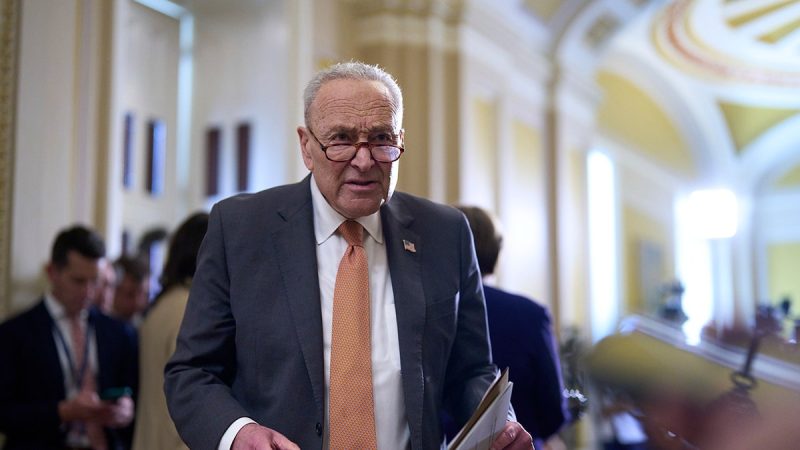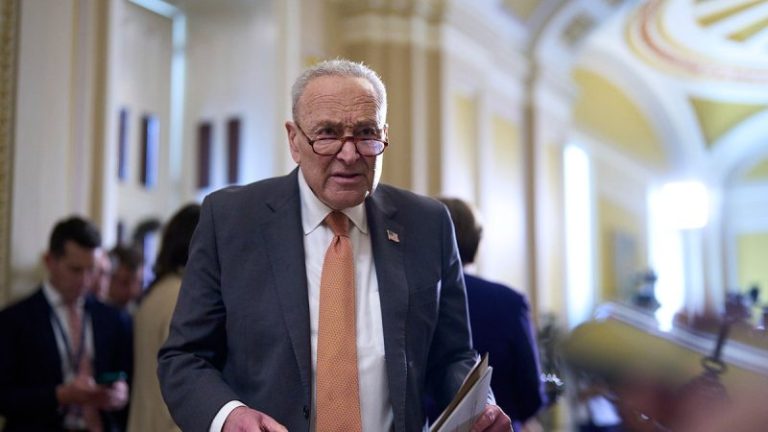
Democrats blocked a Republican-led attempt to provide essential government workers with paychecks amid an ongoing, 23-day shutdown, calling the bill overly selective and incomplete.
That bill, proposed by Sens. Ron Johnson, R-Wis., and Todd Young, R-Ind., failed in a 54-45 vote, where 60 votes were needed to advance the bill over the threat of a filibuster.
Only three Democrats, John Fetterman of Pennsylvania, and Raphael Warnock and Jon Ossoff of Georgia, voted with Republicans.
In addition to compensating federal employees and military personnel during the current shutdown, the bill would also extend relief to future instances where funding bills aren’t in effect.
‘For fiscal year 2026, and any fiscal year thereafter, there are appropriated such sums as are necessary to provide standard rates of pay, allowances, pay differentials, benefits, and other payments on a regular basis to excepted employees,’ the bill reads.
Johnson had pitched his bill as a long-term solution.
‘I just hope, on a nonpartisan basis, we do something that makes sense around here for once,’ Johnson said ahead of the bill’s consideration.
‘With Democrats continuing the Schumer Shutdown, they should at least agree to pay all the federal employees that are forced to continue working. The 2025 Shutdown Fairness Act is a permanent fix that will ensure excepted workers and our troops are paid during a shutdown,’ Johnson said.
Other Republicans blasted Democrats for voting against the bill.
‘It means Democrats don’t care,’ Sen. John Cornyn, R-Texas, said. ‘We know this is going to end sometime. The question is when. I guess it will depend on how much carnage the Democrats want to create. To me, they are in a box canyon, and they can’t figure out how to get out.’
Essential federal employees have been asked to continue working since the government entered a shutdown on Oct. 1 after lawmakers failed to pass spending legislation to begin the 2026 fiscal year. Republicans have advanced a short-term spending extension that would open the government through Nov. 21. Democrats have repeatedly rejected that proposal though, demanding that Congress first consider an extension to expiring COVID-19-era supplemental funding for Obamacare health insurance subsidies.
Republicans, who maintain that the health insurance subsidies are unrelated to the government’s short-term funding needs, have rejected those demands out of hand.
Democrats in the Senate have voted 12 times to defeat the stopgap bill.
The shutdown looks poised to continue with no resolution in sight, prompting lawmakers to worry about key areas that are feeling the shutdown’s effects more acutely. The Johnson-Young supplemental package was the most recent attempt to provide a limited basis for relieving some of that pain.
Ahead of Thursday’s vote, Republicans in the House of Representatives appeared open to considering the Johnson-Young bill.
House Speaker Mike Johnson, R-La., told House Republicans during a lawmaker-only call on Tuesday that his chamber would be ‘prepared to act’ if the bill passed the Senate, Fox News Digital was told. Johnson has repeatedly said he would give lawmakers 48 hours’ notice to return to Washington before any votes but has largely signaled he will keep the House out of session until Senate Democrats pass the GOP’s funding bill.
Johnson also said on the call that he was skeptical the bill would get enough Senate Democratic support to pass.
‘If they oppose the Ron Johnson bill in the Senate, it will be absolutely clear that they are simply using the military and air traffic control and law enforcement and all these other personnel as pawns for their political efforts,’ Johnson said, Fox News Digital was told.
But other lawmakers had hesitations about partially reopening the government, offering relief to some workers and not others. That was the concern of Sen. Richard Blumenthal, D-Conn., ahead of Thursday’s vote.
‘I have a concern about picking and choosing among all the federal workers,’ Blumenthal said.
‘I’m fine to support it. I think we need to pay our military, but I want to define and limit it in a way that provides pay to essential workers who serve our public safety and our national defense,’ Blumenthal said.
Blumenthal voted against the measure.
Democrats in the House of Representatives signaled similar lines of opposition to the idea behind the Johnson-Young bill.
‘It’s not legislation that I support, because it appears to be more like a political ploy to pick and choose, giving Donald Trump discretion [over] which employees should be compensated, and which employees should not be compensated. All employees should be compensated and that will happen when we reopen the government,’ House Minority Leader Hakeem Jeffries, D-N.Y., told reporters on Monday.
Senate Democrats also defeated other pieces of legislation that would open portions of the government. Last week, Democrats in the Senate voted against a 2026 defense spending bill — one of the 12 year-long bills normally used to fund the government.
Aside from the Johnson-Young bill, the Senate will not consider other pieces of spending legislation on Thursday. Senators are scheduled to leave Washington, D.C., on Thursday and will return at the beginning of next week.



